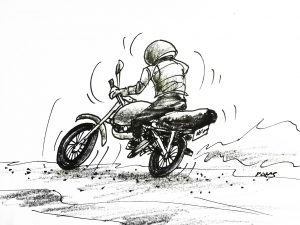Until now, some rice farmers in our region continually use cemented roads and highways as drying fields for their palay despite their knowledge that this convenience comes at a significant cost to public safety. The presence of rice grains on road surfaces creates a hazardous condition for motorists, especially motorbike riders, who are at a high risk of losing control and suffering potentially fatal accidents. The practice is a dangerous tradition that must be halted immediately and the authorities must take decisive action to prevent these preventable tragedies.
The primary concern with drying rice on roads is the slippery surface it creates for vehicles, particularly motorcycles. Motorbike tires, which have less traction than car tires, can easily slide on the loose grains, causing riders to lose control and crash. This danger is amplified at higher speeds, where even a small patch of rice can be enough to cause a devastating accident. The risk is not hypothetical; there have been numerous reports of injuries and fatalities linked to this practice. The safety of road users must take precedence over the convenience of drying palay on public thoroughfares.
Furthermore, roads and highways are built for transportation, not for agricultural purposes. Using them as drying grounds undermines their primary function and creates unnecessary hazards for all users. The disruption caused by this practice extends beyond motorbike riders to all forms of vehicular traffic, including cars, buses, and trucks. Vehicles swerving to avoid patches of rice can lead to collisions and additional accidents, putting even more lives at risk. It is a misuse of public infrastructure that jeopardizes the safety and efficiency of the transportation network.
The responsibility for ending this dangerous practice lies with both the farmers and local authorities. Farmers must recognize that the roads are not extensions of their farms and that using them in this manner endangers the community. Farmers must seek alternative drying methods, such as using designated drying facilities or employing modern drying technology. Simultaneously, local authorities must enforce regulations that prohibit the drying of rice on public roads. This enforcement should include penalties for violations to ensure compliance and deter future incidents.
The safety of passengers, riders, and commuters should be a paramount concern. Allowing the continued use of roads for drying rice not only compromises public safety but also reflects poorly on the community’s commitment to protecting its members. Local authorities should demonstrate a commitment to the well-being of its residents and the proper use of public infrastructure. It is time to prioritize safety and uphold the intended purpose of our roads and highways.




